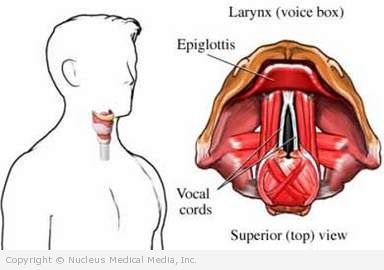Laryngitis – Definition
Laryngitis is swelling of the mucous membrane of the larynx (voicebox). This swelling usually involves the vocal cords, and leads to hoarseness or even complete loss of voice.
Laryngitis – Causes
Common causes of laryngitis, hoarseness, or voice loss are:
- Upper respiratory tract infection — This is most often caused by a virus, such as the common cold.
- Irritation caused by voice overuse — Overuse can be caused by yelling, singing, and speaking loudly for extended periods of time.
- Airborne irritants — Irritants include cigarette smoke and pollen, dust, and mold allergens.
- Vocal nodules — These are benign lesions (similar to calluses) that are caused by thickening of the epithelial tissue of the vocal cords.
- Vocal polyps — These are soft, fluid-filled lesions on the vocal cords, which can be caused by one episode of voice abuse. The polyps may become cancerous, particularly in smokers.
- Infections — Infections may include tuberculous laryngitis and fungal laryngitis.
- Gastroesophageal reflux disease (GERD) — GERD is stomach acid that rises up in the esophagus and irritates the vocal folds.
Other less common causes of hoarseness or voice loss include:
- Functional dysphonia — abnormal use of the vocal mechanisms despite normal anatomy
- Laryngeal papilloma — growths on the larynx caused by human papilloma viral infection
- Muscle tension dysphonia — a voice disorder caused by excessive or unequal tension while speaking
- Reinke’s edema — an accumulation of fluid in the vocal cords, usually associated with smoking
- Spasmodic dysphonia — a condition resulting in irregular voice breaks
- Vocal cord paralysis — weakness or immobility of the vocal cords
- Side effects from inhaled medications used for asthma
Laryngitis – Risk Factors
A risk factor is something that increases your chance of getting a disease or condition.
Risk factors include:
- Smoking and exposure to secondhand smoke
- Excessive use of the voice as in singing, public speaking, or yelling
- Allergies to dust, mold, and pollen
- Excess alcohol consumption
- Recent respiratory infection
- Uncontrolled GERD
- Dehydration
- Stress
- Recent travel
Laryngitis – Symptoms
Symptoms include:
- Hoarseness (raspiness, breathiness, and strain) or loss of voice
- Changes in volume (loudness) or in pitch (how high or low the voice is)
- Sore throat
- Sensation of a “lump” in the throat
Laryngitis – Diagnosis
A doctor should examine you if you experience the following:
- Hoarseness that has no obvious cause or has lasted longer than 2-3 weeks
- Hoarseness with difficulty swallowing or breathing, coughing up blood, a lump in the neck, or throat pain out of proportion to that usually seen with the common cold
- For some of these symptoms, emergency medical evaluation is indicated. If you have any questions about how quickly to seek care, call your doctor or a local emergency facility.
- Complete loss of voice or severe change in voice lasting longer than a few days
Your doctor will ask about your symptoms and medical history, and perform a physical exam.
You may be referred to an otolaryngologist, also called an ENT (ear, nose, throat) doctor, if your laryngitis does not have an easily identified cause or cure.
An ENT doctor will also ask about your medical history and examine your voicebox using a flexible, lighted scope that is passed through your nose and down the back of the throat. In some cases, the doctor will place a mirror in the back of your mouth to see your voicebox. Under some circumstances, other tests may be indicated to evaluate swallowing mechanisms or other processes related to normal voice functioning.
Laryngitis – Treatment
Laryngitis caused by seasonal allergies, cold or flu, or other viral respiratory infection usually resolves itself within two weeks. To relieve symptoms during this time:
- Rest your voice.
- Drink plenty of fluids.
- Avoid smoking.
- Take nonprescription pain relievers (like acetaminophen, ibuprofen) as needed.
- Try steam inhalation.
Treating the Underlying Illness
Managing underlying illnesses, such as GERD or viral infections, often relieves laryngitis.
Surgery
Surgery may be performed to treat growths on the vocal cords, vocal cord paralysis, or some other laryngeal disorders.
Voice Therapy
Laryngitis as a result of voice overuse usually resolves itself within a few days. Voice therapy is often used to treat voice problems, especially those related to vocal overuse. Voice therapy consists of:
- Voice education
- Healthy use of the voice
- Instruction in proper voice technique and use of the breathing muscles
- The Alexander technique — a method to treat voice impairment by practicing proper breathing and posture
If you are diagnosed with laryngitis, follow your doctor’s instructions.
Laryngitis – Prevention
You may not be able to prevent some of the illnesses and disorders that can cause laryngitis. However, to prevent and treat mild hoarseness related to laryngitis, the American Academy of Otolaryngology, Head, and Neck Surgery recommends the following:
- If you smoke, quit.
- Avoid secondhand smoke.
- Avoid agents that can dehydrate the body, such as alcohol and caffeine.
- Drink plenty of fluids.
- Humidify your home.
- Avoid acidic or spicy foods if you are prone to GERD.
- Try not to use your voice for too long or too loudly.
- Seek professional voice training.
- Avoid speaking or singing when your voice is injured or hoarse.

